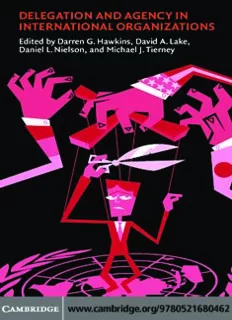
Delegation and Agency in International Organizations (Political Economy of Institutions and Decisions) PDF
Preview Delegation and Agency in International Organizations (Political Economy of Institutions and Decisions)
This page intentionally left blank DELEGATION AND AGENCY IN INTERNATIONAL ORGANIZATIONS Why do states delegate certain tasks and responsibilities to international organizationsratherthanactingunilaterallyorcooperatingdirectly?Further- more, to what extent do states continue to control IOs once authority has been delegated? Examining a variety of different institutions, including the WorldTradeOrganization,theUnitedNations,andtheEuropeanCommis- sion, this book explores the different methods that states employ to ensure their interests are being served and identifies the problems involved with monitoring and managing IOs. The contributors suggest that it is not in- herently more difficult to design effective delegation mechanisms at the international level than at the domestic level. Drawing on principal-agent theory,theyexplainthevariationsthatexistintheextenttowhichstatesare willing to delegate to IOs. They argue that IOs are neither all evil nor all virtuous,butarebetterunderstoodasbureaucraciesthatcanbecontrolledto varyingdegreesbytheirpoliticalmasters. DARREN G. HAWKINS isAssociateProfessorofPoliticalScienceatBrigham YoungUniversity. DAVID A. LAKE is Professor of Political Science at the University of California,SanDiego. DANIEL L. NIELSON is Associate Professor of Political Science at Brigham YoungUniversity. MICHAEL J. TIERNEY isAssistantProfessorofGovernmentatTheCollege ofWilliam&Mary. POLITICAL ECONOMY OF INSTITUTIONS AND DECISIONS Serieseditors RandallCalvert,WashingtonUniversity,St.Louis ThrainnEggertsson,MaxPlanckInstitute,Germany,andUniversityofIceland Foundingeditors JamesE.Alt,HarvardUniversity DouglassC.North,WashingtonUniversity,St.Louis Otherbooksintheseries AlbertoAlesinaandHowardRosenthal,PartisanPolitics,DividedGovernment, andtheEconomy LeeJ.Alston,ThrainnEggertssonandDouglassC.North,eds.,EmpiricalStudies inInstitutionalChange LeeJ.AlstonandJosephP.Ferrie,SouthernPaternalismandtheAmerican WelfareState:Economics,Politics,andInstitutionsintheSouth,1865–1965 JamesE.AltandKennethA.Shepsle,eds.,PerspectivesonPositivePolitical Economy JosephineT.Andrews,WhenMajoritiesFail:TheRussianParliament, 1990–1993 JeffreyS.BanksandEricAllenHanushek,eds.,ModernPoliticalEconomy:Old Topics,NewDirections YoramBarzel,EconomicAnalysisofPropertyRights,2ndEdition YoramBarzel,ATheoryoftheState:EconomicRights,LegalRights,andthe ScopeoftheState RobertH.Bates,BeyondtheMiracleoftheMarket:ThePoliticalEconomyof AgrarianDevelopmentinKenya,2ndEdition CharlesM.Cameron,VetoBargaining:PresidentsandthePoliticsof NegativePower KellyH.Chang,AppointingCentralBankers:ThePoliticsofMonetaryPolicyin theUnitedStatesandtheEuropeanMonetaryUnion PeterF.CowheyandMathewMcCubbins,eds.,StructureandPolicyinJapan andtheUnitedStates:AnInstitutionalistApproach GaryW.Cox,TheEfficientSecret:TheCabinetandtheDevelopmentofPolitical PartiesinVictorianEngland GaryW.Cox,MakingVotesCount:StrategicCoordinationintheWorld’s ElectoralSystems GaryW.CoxandJonathanN.Katz,ElbridgeGerry’sSalamander:TheElectoral ConsequencesoftheReapportionmentRevolution Continuedonpagefollowingindex DELEGATION AND AGENCY IN INTERNATIONAL ORGANIZATIONS Edited by DARREN G. HAWKINS DAVID A. LAKE DANIEL L. NIELSON AND MICHAEL J. TIERNEY cambridge university press Cambridge,NewYork,Melbourne,Madrid,CapeTown,Singapore,SãoPaulo Cambridge University Press TheEdinburghBuilding,Cambridgecb22ru,UK PublishedintheUnitedStatesofAmericabyCambridgeUniversityPress,NewYork www.cambridge.org Information on this title: www.cambridg e.org /9780521680462 ©CambridgeUniversityPress2006 Thispublicationisincopyright.Subjecttostatutoryexceptionandtotheprovisionof relevantcollectivelicensingagreements,noreproductionofanypartmaytakeplace withoutthewrittenpermissionofCambridgeUniversityPress. Firstpublishedinprintformat 2006 isbn-13 978-0-511-25981-4eBook(EBL) isbn-10 0-511-25981-6eBook(EBL) isbn-13 978-0-521-68046-2paperback isbn-10 0-521-68046-8paperback CambridgeUniversityPresshasnoresponsibilityforthepersistenceoraccuracyofurls forexternalorthird-partyinternetwebsitesreferredtointhispublication,anddoesnot guaranteethatanycontentonsuchwebsitesis,orwillremain,accurateorappropriate. Contents 353258 List of figu res pa ge vii List of tabl es viii Note s on contributor s x Pr eface xv Pa rt I: Intr oductio n 1 1 Delegation underanarchy: states, international organizations, and principal-agent theory DARREN G. HAWKINS, DAVID A. LAKE, DANIEL L. NIELSON, AND MICHAEL J. TIERNEY 3 Pa rt II: Variatio n in princ ipal preferenc es, structure , decision rules, an d private be nefits 39 2 Who delegates? Alternativemodels ofprincipals in development aid MONA M. LYNE, DANIEL L. NIELSON, AND MICHAEL J. TIERNEY 41 3 US domesticpoliticsand InternationalMonetary Fund policy J. LAWRENCE BROZ AND MICHAEL BREWSTER HAWES 77 4 Why multilateralism? Foreign aidand domestic principal-agentproblems HELEN V. MILNER 107 5 Distribution, information, and delegation tointernational organizations: the case of IMF conditionality LISA L. MARTIN 140 v Contents 6 Delegation and discretionin the European Union MARK A. POLLACK 165 Part III: Variatio n in agent preferenc es, legitim acy, tasks , and perm eability 197 7 How agents matter DARREN G. HAWKINS AND WADE JACOBY 199 8 Screening power: international organizations as informative agents 229 ALEXANDER THOMPSON 9 Dutiful agents, rogueactors, or both? Staffing,voting rules, and slackin the WHO and WTO ANDREW P. CORTELL AND SUSAN PETERSON 255 10 Delegating IMFconditionality:understanding variations incontrol and conformity ERICA R. GOULD 281 11 Delegation tointernational courts and the limits of re-contracting political power KAREN J. ALTER 312 Part IV: Direc tions for future research 339 12 The logic ofdelegation to international organizations DAVID A. LAKE AND MATHEW D. MCCUBBINS 341 Referen ces 369 Index 394 vi Figures 1.1 Internationaldelegation decision tree page 11 2.1 Types ofagency relationships 45 2.2 Socialpercentof MDB projects, 1980 –1999 (three-year rolling average) 55 2.3 Socialpreferences forthe InternationalBank for Reconstruction and Development (WorldBank), 1980 –1999 withalternative models ofthe principal 64 3.1 Chain ofdelegation 79 4.1 Percentage ofmultilateral aidcommitted relative to total ODA committed 113 4.2 PublicopinionintheEUnetpercentagewithgreater confidence inmultilateral than bilateral organizations 121 5.1 Stateandstaffpreferences over stringencyof conditionality 143 8.1 Implications of variationin institutional neutrality 248 8.2 Preference distributions regarding military intervention 251 9.1 Institutionaldesignand IO slack 263 10 .1 Change inthe number and type of binding conditions, 3-year moving average 299 12 .1 Delegation withcommunication 351 12 .2 The knowledge condition 357 12 .3 The conditions forsuccessful delegation 359 12 .4 Delegation withmultiple principals 362 vii Tables 2 .1 Hypothetical pivotalplayers pa ge 62 2 .2 Hypothetical multiple principal 63 2 .3 Logistic regressionresultswith social loan as dependent variable using the Social Policy Index to generate principal preferences 67 2 .4 Logistic regressionresultswith social loan as dependentvariable using thebilateral social foreign aidto generate principal preferences 70 3 .1 IMF quota votes in the US Congress 88 3 .2 Probit analyses of IMF quota votes in the 98 th Congress 90 3 .3 Probit analyses of IMF quota votes in the 98 th Congress (robustness) 91 3 .4 Probit analyses of IMF quota votes in the 105 th Congress 92 3 .5 Substantive effectsof campaigncontributions from money-center banks, districtskilllevels, and House member “ideology” 93 3 .6 Random effects logit ofIMF decisions tolend 99 3 .7 OLS panel estimates of the size of IMFloans 101 4 .1 Summarystatistics forvariables 127 4. 2A Multilateral commitments as %total ODA committed and OPINION 1 128 4. 2B Multilateralcommitmentsas%totalaidcommitted and OPINION 1 130 4. 3A Multilateral commitments as %total ODA committed and OPINION 3 134 viii
Description: